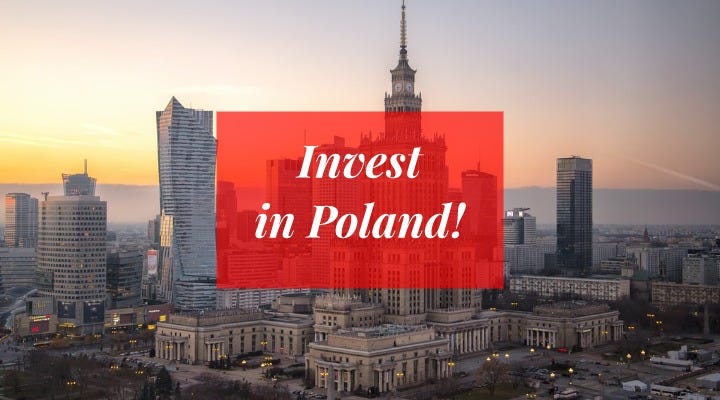Foreign investors like Poland, and Poland likes them. Year after year, we observe increasing interest from foreign capital in Poland. Currently, it accounts for approximately 3-4% of Poland’s gross domestic product (GDP). A revolution is also taking place in the stock market. In the first half of 2023, foreign investors had the largest share in trading on the Warsaw Stock Exchange (65%, up 2% compared to the previous year).
Poland is perceived as a stable country with excellent development indicators, predictability, and safety. It’s worth noting that for over three decades, the country has maintained steady economic growth. Even in the face of a global crisis, the Polish economy is expected to slow down, like others, but its indicators will still look favorable on the European map, even better than many “old” European economies. Investing in Poland is also an expression of confidence in its macroeconomic policies. The latest analyses, such as the McKinsey & Company report “Poland 2030: A chance to join the economic big league,” contribute to building this trust. Inflation exists, and companies must learn to live with it.
Inflation is present and will persist for some time. Business owners should keep it in mind, but it shouldn’t paralyze their plans and actions. Every country’s role is to strive for reducing its level, which is happening globally. Here, cautious fiscal policies and multifaceted care for the economy’s gradual, even slight growth are important. Inflation levels are influenced, among other things, by rising energy prices related to the conflict in Ukraine and Russia’s backward steps in relations with the West. Even if the situation on this front doesn’t stabilize, significant efforts have already been made, especially in Central Europe, to become less dependent on Russian supplies. The worst seems to be behind us.
What attracts foreign investors?
It is often emphasized that Poland is a perfectly located and stable country with a vast pool of skilled workers. It’s worth mentioning what foreign investors themselves highlight. Polish companies collaborating with foreign investors are seen as those that conduct processes quickly and efficiently. Here, time indeed equals respect for money because money counts. Several decades of belonging to the Western world have allowed the development of highly skilled managerial personnel who excel in project management. This is visible and appreciated.
Things are good, but the war continues. What could the scenarios be?
The past two years have shown how one decision can destabilize a country, but on the other hand, how quickly actions can be changed to ensure the smooth functioning of nations and the financial security of their citizens. Currently, Ukraine is a country that won’t attract investors, even though the excellent development of Central and Eastern Europe used to attract them there as well. Furthermore, many companies plan to relocate to safe zones, including Poland. The reconstruction of Ukraine after the war, which will eventually end, will likely involve a significant role for Poland, which will undoubtedly have a positive impact on economic indicators. This is a tremendous opportunity for businesses operating in Poland.
A more international economy, but in what direction?
It can certainly be said that the Polish economy is international. Companies in Poland are increasingly establishing branches abroad and exporting both products and services, and this extends beyond Europe. Cooperation with Asia and Africa is gaining increasing interest in a world moving away from unipolarity. It’s worth mentioning that there are institutions in Poland that aim to facilitate business entry into foreign markets, including the Polish Investment and Trade Agency and KUKE – the Export Credit Insurance Corporation.
What about the Polish market?
Poland has tens of millions of potential consumers. It’s a large and still receptive market. Polish consumers are interested in new products and innovations. However, they are also becoming more demanding and interested in product composition and corporate social responsibility. Cultural context is also important when establishing a business in Poland. The pockets of Polish consumers vary, but there is an increasingly visible affluent group with relatively significant resources that want to spend on premium products. Despite demographic challenges affecting the “old world,” the strongest segment in the consumer market consists of individuals from the 1980s baby boom, and their children will soon join in purchasing.
